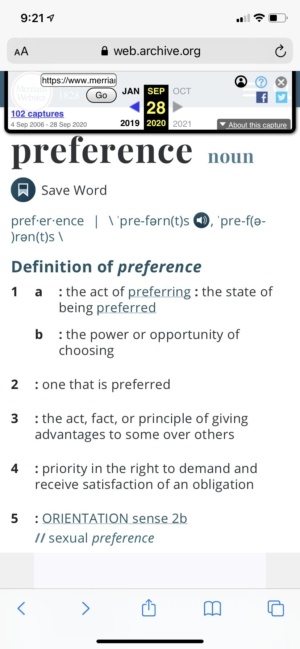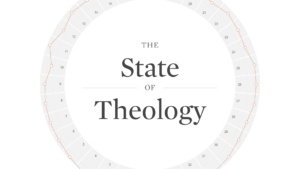BigSocMedia does not want you to be able to read an article in the New York Post concerning Hunter Biden and his connections to Burisma etc. Without commenting on the merits of the article, I am only posting this link here in . . . Continue reading →
October 2020 Archive
More On New Definitions (Updated)
In 2016, Advocate a leading LGBTQ news and commentary magazine published an article in which an author used the phrase “sexual preference” non-ironically and with not hint of shame. As recently as 19 days ago, this same magazine used the expression in a . . . Continue reading →
Brooks Describes The Problem But Does He Answer The Central Question: Why?
During most of the 20th century, through depression and wars, Americans expressed high faith in their institutions. In 1964, for example, 77 percent of Americans said they trusted the federal government to do the right thing most or all of the time. Then came the last two moral convulsions. In the late 1960s and ’70s, amid Vietnam and Watergate, trust institutions collapsed. By 1994, only one in five Americans said they trusted government to do the right thing. Then came the Iraq War and the financial crisis and the election of Donald Trump. Institutional trust levels remained pathetically low. Continue reading →
What The Court-Packing Debate Teaches Us About Defining The Adjective Reformed
Since about last Friday, the expression “court packing” has received a marvelous new definition. From the “things you should have learned in school” file, it was president Franklin Delano Roosevelt, the Thirty-Second President of the United States, who, in 1937, threatened to . . . Continue reading →
Stephens On The 1619 Project
The 1619 Project is a thesis in search of evidence Continue reading →
On The King James Only Movement, The Majority Text, And Text Criticism
Preface As a young Christian, as I was beginning to study Greek and to learn the Reformed theology, piety, and practice, I could see the textual apparatus in the footnotes of my copy of the Greek New Testament but I could not . . . Continue reading →
11 Thousand Scientists And Medical Practioners: End The Lockdown
Coming from both the left and right, and around the world, we have devoted our careers to protecting people. Current lockdown policies are producing devastating effects on short and long-term public health. The results (to name a few) include lower childhood vaccination . . . Continue reading →
National Association Of Scholars: Revoke Pulitzer Prize For 1619 Project
The Project as a whole was marred by similar faults. Prominent historians, most of them deeply sympathetic to the Project’s goal of bringing the African American experience more fully into our understanding of the American past, nevertheless felt obliged to point out, . . . Continue reading →
Back In Print! Ames On The Heidelberg Catechism And Caspar Olevianus On The Apostles’ Creed
William Ames, A Sketch of the Christian’s Catechism. Classic Reformed Theology. Todd Rester, trans. (Grand Rapids: Reformation Heritage Books, 2008). Ames (1576–1633) exposits a particular text of Scripture that supports the main thoughts for a given Lord’s Day in the Heidelberg Catechism . . . Continue reading →
Office Hours: Joel Kim On Returning To Class And Forty Years Of Faithfulness
The beginning of the Fall semester for the academic year 2020–21 marked the beginning of the 40th year of Westminster Seminary California. In 1980 we were in an office complex in San Marcos, CA and in the fall of 1984 we began . . . Continue reading →
Critical Theory Seeks To Suppress Dissent In America
One of the several reasons that Americans ought to be concerned about the inroads being made by Critical Theory (e.g., Critical Race Theory, Critical Legal Theory) into American life is its fundamentally anti-American view of free speech. Rod Dreher highlights the latest . . . Continue reading →
New Resource Page: On Abortion
The sixth commandment of God’s holy moral law says, “You shall not murder.” Christians have always understood this to prohibit abortion, i.e., the unjust taking of a human life in utero. The Didache (c. AD 114), an early Christian document testifying to . . . Continue reading →
CRT Indoctrination Reminds Former Intelligence Analyst Of Communist Brainwashing Technique
If you review the training sessions for [Critical Race Theory] facilitators, the process is eerily similar to such communist processes of coercive thought reform. First of all, the employees are put into a controlled environment, isolated from other influences and under the . . . Continue reading →
Grace United Reformed Church (Portland): Sitting On The Edge Of The Volcano
“Honestly, the physical presence of protests and related violence feels as distant to most of my congregation as it does to you,” he told [Christian Renewal]. “However, we are seeing and experiencing disturbing results on a daily basis. The impact on our . . . Continue reading →
It Was Not Spontaneous
While talking heads on television routinely described it as a spontaneous eruption of anger at racial injustice, it was strategically planned, facilitated and advertised on social media by anarchists who believed that their actions advanced the cause of racial justice. In some . . . Continue reading →
H. Richard Niebuhr On Evangelical Theology In the 21st Century?
A God without wrath brought men without sinto a Kingdom without judgment through the ministrations of a Christ without a Cross. H. Richard Niebuhr, The Kingdom of God in America (New York: Harper & Row, 1959 [1937]) 193. (HT: Dustin Burge) Resources . . . Continue reading →
The State Of Evangelical Theology 2020: The Crisis Deepens
For a few years now Ligonier, in conjunction with Lifeway, has been conducting surveys of Americans (and others) to track the state of American Christianity. They want to know, as they write, what “Americans believe about God, salvation, ethics, and the Bible.” . . . Continue reading →









